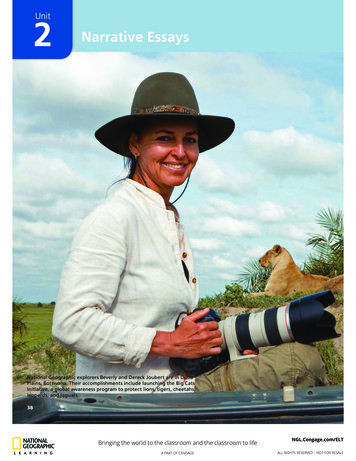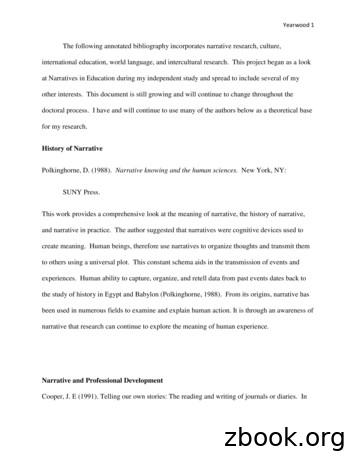A Narrative Approach To Academic Advising: Helping .
A Narrative Approach to Academic Advising:Helping Students Create Their StoriesPresenters:Peter L. HagenRichard TramaAssociate Dean of General Studies andDirector of the Center for Academic AdvisingStockton UniversityPeter.Hagen@stockton.eduAssistant Director of Academic AdvisingStockton UniversityRichard.Trama@stockton.eduOverviewOur presenters will share their insights about how narrative—storytelling—can inform the work we do as academicadvisors. When we listen to the concerns that bring students to our offices, we are essentially listening to them tell thestories of their lives. When we impart advice to them, we are essentially sharing with them how their stories mightunfold. In this webinar, the presenters will explore how advisors might become more skilled at storytelling and story‐listening. Moreover, the presenters will outline some ways in which we might cultivate the storytelling skills of ourstudents in order to help them to create their own educational stories. The presenters will share their stories with youand also some ideas and techniques about how you can implement a narrative approach to advising.The Seven Basic Plots in Advising(adapted from Booker, C. (2004) The Seven Basic Plots: Why We Tell Stories, Bloomsbury Academic Press.)Plot TypeOvercomingthe Monster(Battle; thrilling escape fromdeath; kingdom restored)Rags to Riches(A central crisis movesprotagonist to maturity)The Quest(Protagonist sets out onjourney with companions;overcomes obstacles;attains goal; finds meaning)Examples fromliterature/filmBeowulfEpic ofGilgameshDr. NoHunger GamesAladdinCinderellaOdysseyLord of theRingsHypothetical advising situationsYour student has dropped Organic Chemistry twice and is failing it currently.That failing doesn’t seem to you, as the advisor, to be based on inability.Your student comes from a poor socioeconomic background. S/he tells youthat s/he is majoring in engineering in order to earn lots of money in life.The student is searching for a sense of fulfillment. S/he is majoring in biologyin order to prepare for occupational therapy. S/he has a taken severalphilosophy and religion courses as electives and has a strong passion forthese areas.A Narrative Approach to Academic AdvisingPage 1
Voyageand Return(The protagonist lands in arealm where the normallaws don’t apply)Comedy(Plagued bymisunderstandings and darkforces, the protagonist isfinally redeemed)Tragedy(The flawed protagonist isdestroyed by his/her ownblindness)Rebirth(The protagonist is not onlyredeemed, buttransformed)Priscilla, Queenof the DesertYour student had to leave school for health or financial reasons. Comes backto college now as an adult learner better prepared to encounter the demandsof college work.EmmaStrictlyBallroomYour advisee is juggling full‐time credit load with a full time job. S/he comesto you to approve a course overload to complete the third minor andgraduate this semester. To do so, s/he will have to take 28 credits thissemester. How to turn this potential tragedy into a comedy?Oedipus RexHamletYour student’s priorities have shifted away from academic pursuits andmoved to social pursuits big time. Not only have grades suffered, butgraduation is also threatened. Is an unhappy ending inevitable?Silas MarnerLion KingA ChristmasCarolYour student is a returning veteran who suffers from PTSD, has no priorcollege experience. S/he is gradually but totally transformed by experiencesin classes where s/he learns to see the world in completely new ways and is“reinvented” as a new person. The PTSD diminishes, too.A Narrative Approach to Academic Advising: for Further ReadingOvercoming the MonsterAnonymous: BeowulfSilver Linings Playbook [Film]John Irving: A Prayer for Owen MeanyWagner: Sigfried [Opera]Rags to RichesAladdin [Film]Cinderella [Film]The QuestSeven Samurai [Film]Rocky [Film]Voyage and ReturnHomer: OdysseyJ.R.R. Tolkein: Lord of the RingsPriscilla, Queen of the Desert [Film]ComedyJane Austen: EmmaStrictly Ballroom [Film]Muriel’s Wedding [Film]W.A. Mozart: The Magic Flute [Opera]TragedySophocles: Oedipus Rex [Play]Edward Albee: Who’s Afraid of Virginia Woolf? [Play]RebirthGeorge Eliot: Silas MarnerLion King [Film]Charles Dickens: A Christmas CarolNarratives 2.0 (not for the faint of heart!)Phillip Glass: Satyagraha [Opera]John Adams: The Death of Klinghoffer [Opera]A Narrative Approach to Academic AdvisingPage 2
Moshim Hamid: Reluctant FundamentalistFrancis Poulenc: Dialogues of the Carmelites [Opera]Mikhail Bulgakov: The Master and MargaritaJames Joyce: UlyssesJoseph Conrad: Heart of DarknessApocalypse Now [Film]Hilary Mantel: Wolf HallIan McEwan: AtonementJeffrey Eugenides: MiddlesexWorks Cited / Further ReadingBooker, Christopher (2004). The Seven Basic Plots: Why We Tell Stories. London: Continuum.Bruner, Jerome (2004). “Life as Narrative,” Social Research, 71:3, 691‐710.Campbell, Joseph (1956). Hero With A Thousand Faces. New York: World.Champlin‐Scharff, Sarah, and Peter L. Hagen (2013). “Understanding and Interpretation: A Hermeneutic Approach toAdvising.” In Jayne K Drake, Peggy Jordan, and Marsha Miller (eds.) Academic Advising Approaches: Strategiesthat Teach Students to Make the Most of College, San Francisco: Jossey‐Bass, pp. 223‐239.Chatman, Seymour (1978). Story and Discourse: Narrative Structure in Fiction and Film. Ithaca: Cornell University Press.Geertz, Clifford (1973). The Interpretation of Culture: Selected Essays. New York: Basic Books.Gergen, Kenneth (1991). The Saturated Self: Dilemmas of Identity in Contemporary Life. New York: Basis Books.Gottschall, J. (2012). The Storytelling Animal: How Stories Make Us Human. Boston: Houghton Mifflin Harcourt.Hagen, P.L. (2007, Sept). Narrative theory and academic advising. Academic Advising Today, 36(2). Available y‐and‐Academic‐Advising.aspxRose, Phyllis (1983). Parallel Lives: Five Victorian Marriages. New York: VintageSarup, Madan (1996). Identity, Culture and the Postmodern World. Edinburgh: Edinburgh University Press.Website for “Project MyStory” at SUNY Albany story/A Narrative Approach to Academic AdvisingPage 3
1/11/2016A Narrative Approach toAcademic Advising: HelpingStudents Create Their StoriesPeter L. Hagen and Richard TramaStockton UniversityNACADA: The Global Community for Academic AdvisingCopyright 2016 All Rights ReservedMajor Claim #1We can view human life as a narrative“We spend our lives crafting stories that make us thenoble—if flawed—protagonists of first‐person dramas.A life story is a “personal myth” about who we are deepdown—where we come from, how we got this way, andwhat it all means. Our life stories are who we are.They are our identity. A life story is not, however, anobjective account. A life story is a carefully shapednarrative that is replete with strategic forgetting andskillfully spun meanings.”‐Jonathan Gottschall, The Storytelling Animal (2012)Major Claim #2Students are humans If we can view human life as narrative and view studentsas human(!), then we can begin to see advising thosespecial humans as having something to do with narrative.Photo courtesy of Jirka Matousek via Creative Commons1
1/11/2016Major Claim #3So maybe it’s not going too far to saythat good advising depends on narrative Listening. Students’ lives might not literally bestories, but putting their lives into a story isthe only way they have to convey to advisorswhat that lived life is like. Advising. Telling stories is one of the mainmodalities advisors use in order to advise.Major Claim #4We help students write theStory of Their Education The chapters that advisors are helping their studentsto write are very important ones. We could call them “The Story of This Student’sEducation.” In the field of literature, stories of education oracculturation are called “bildungsromane.”– James Joyce: Portrait of the Artist as a Young Man– Jane Austen: EmmaMajor Claim #5What we already know aboutnarrative can foster good advising If academic advising is so very much tied up instorylines, in narrative, then what we alreadyknow about narrative can foster good advising. So! What do we already know about narrative?2
1/11/2016ContextContext—The frame in which the otherelements of narrative house themselves. Thereading situation. The speaking situation. Inadvising, the discourse in the office/email.– Author Real author Implied author– Audience Real audience Implied audienceStyleStyle—how the story is told– Point of view: Who is really telling “The Story ofThis Student’s Education”?– Characterization: How does the student portrayhis/her identity? Valiant Warrior? Victim ofCircumstance?– Symbols and imagery: What metaphors are thestudent using to relate his/her experiences?– Diction, language usage: Frankly, how good is thestudent at telling the story? Is that student atrustworthy narrator?ThemeTheme—the meaning of the narrative for theauthor and the audience. This is only available tous through the art or science of interpretation:hermeneutics.Photo courtesy of The U.S. Army via Creative Commons3
1/11/2016PlotWe have been heavily influenced by the work ofChristopher Booker (2004): The Seven Basic Plots:Why We Tell Stories, wherein he argues that thereare, well, seven basic plots: Overcoming the Monster, Beowulf Rags to Riches, Aladdin, Cinderella The Quest, Lord of the Rings Voyage and Return, Priscilla, Queen of the Desert Comedy, Taming of the Shrew Tragedy, Hamlet Rebirth, A Christmas CarolConclusionBased on above claims: If we advisors are helpingstudents co‐construct “The Story of TheirEducation,” then students’ and advisors’ narrativeskills should be fostered and developed.Photo courtesy of NACADA member Nancy MarkeeHow shall advisors be taughtnarrative skills? As listeners, we can enhance our interpretiveskills by exposing ourselves to difficultnarratives. As storytellers, we can focus on our ownstories and by readingbiographies/autobiographies. Or by readingbildungsromane.4
1/11/2016How shall students be taughtnarrative skills? Ask questions that focus on the narrative.Demonstrate your interest as a listener.Assign readings.Ask them to write!Photo courtesy of NACADA member DeLaine PriestA Narrative Approach to Academic AdvisingPanelists:Peter L. Hagen, Associate Dean of General Studies and Director of theCenter for Academic Advising, Stockton UniversityRichard Trama, Assistant Director of Academic Advising, StocktonUniversityNACADA: The Global Community for Academic AdvisingCopyright 2016 All Rights ReservedAll recordings of NACADA materials are copyrighted by the National Academic AdvisingAssociation. See http://www.nacada.ksu.edu/copyright.aspx for NACADA’s completeCopyright statement5
Narrative theory and academic advising. Academic Advising Today, 36(2). Available at . Identity, Culture and the Postmodern World. Edinburgh: Edinburgh University Press. .
A narrative essay tells a story. In fact, narrative is another word for story. In this unit, you will learn how to organize and write a narrative essay. Even though the narrative essay has the same basic form as most other academic essays, it allows the writer to be a little more creative than academic essays usually do.
development. The narratives discussed in this article included (1) narrative of social criticism, (2) narrative of apprenticeship, (3) narrative of reflective practice, (4) narrative of journey, and (5) narrative of hope. Each of these forms provides an avenue for further discovery, development, and growth that not only can help create a second self for teachers, but also build more meaningful .
difference between a compiled genealogy, a narrative genealogy, a narrative lineage, and a narrative pedigree?”, Certification: Frequently Asked Questions (FAQ).] The operative word in the BCG Application Guide is narrative. Charts, family group sheets, non-narrative pedigrees and the like will not satisfy the requirement.
The Interesting Narrative of the Life of Olaudah Equiano . UNDERSTANDING Gustavus Vassa, or Olaudah Equiano, was the first successful professional author of African descent in the English-speaking world. His Interesting Narrative is a spiritual autobiography, captivity narrative, travel book, ad
types of Narrative Writing: 1. Personal Narrative: When a person writes about himself or about his experiences. In this style of narrative writing, the writer already has a plot. Name one example of a personal narrative we have read this year. Grandpa She doesn't get eaten by the eels at this time The Grandson What? Grandpa The eel doesn't get her.
narrative theory’s focus over the past forty years—from literary narrative to narrative . and postmodern guises, and in their oral, print, visual (film, sculpture, painting, performance), digital and multi-media formats. In this way, narrative theory has gone much further down the road that Scholes and Kellogg travelled in 1966. While .
acknowledge the narrative statement in MyPerformance or on the DD Form 2906. Creating a Narrative Statement Steps to Create a Narrative Statement 1. On the MyPerformance Main Page, select the performance plan you want to create a narrative statement for, make sure Action column reflects Update and select Go button. You
work/products (Beading, Candles, Carving, Food Products, Soap, Weaving, etc.) ⃝I understand that if my work contains Indigenous visual representation that it is a reflection of the Indigenous culture of my native region. ⃝To the best of my knowledge, my work/products fall within Craft Council standards and expectations with respect to























